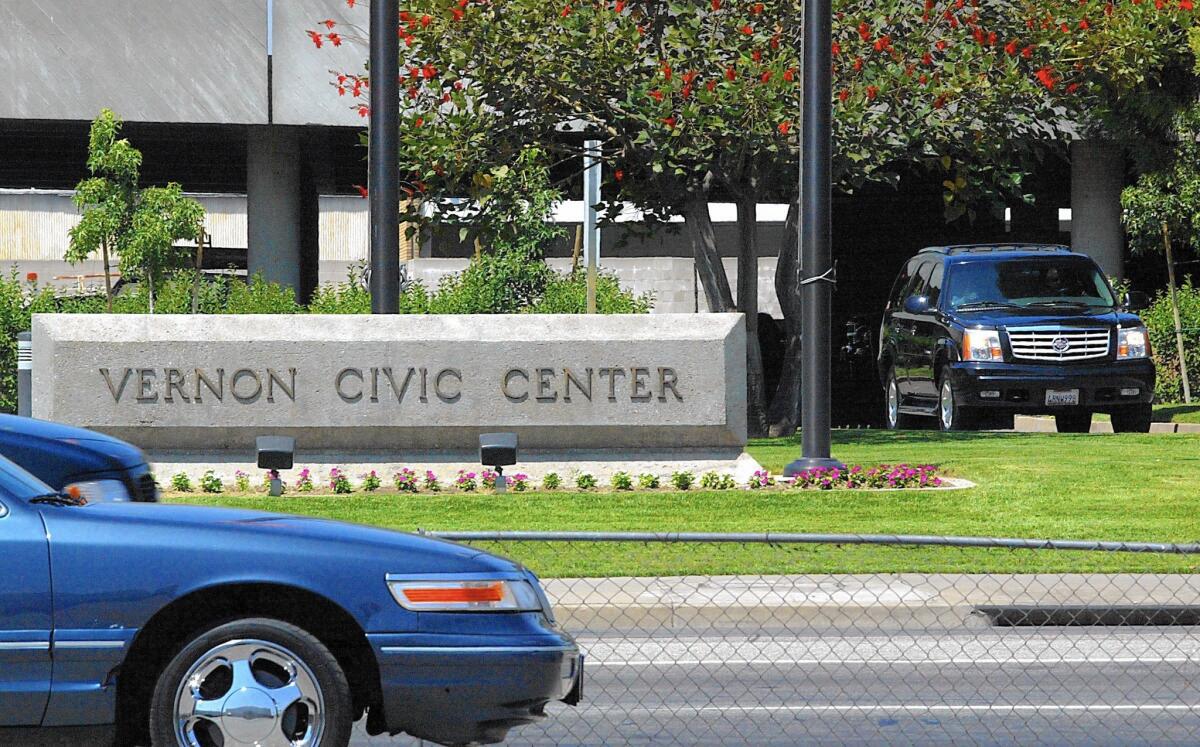‘True Detective’ setting based on California city with a corrupt past

- Share via
After months of mystery, Nic Pizzolatto, the creator of HBO’s “True Detective,” has offered some hints about the new season, which begins Sunday.
Times readers might find the storyline a bit familiar.
Pizzolatto told Vanity Fair and GQ that the second season is based on the tiny industrial city of Vernon, located south of downtown L.A. In the show, the fictional town is called Vinci.
The Times has written extensively about past corruption in the real-life city of Vernon, dating back to the 1920s. In the past, critics have called the city a fiefdom run by a small cabal who controlled the population of about 100 people and used the city’s coffers to lavish themselves with huge salaries and expensive meals and trips. After a series of investigative stories in 2010, the state Legislature attempted to disincorporate the city, but that effort failed. Since then, new leaders emerged and reform efforts were undertaken, including allowing the creation of private housing to boost Vernon’s population and slashing of City Council members’ salaries.
CITY HALL’S BLESSING
Frederic MacFarlane, a spokesman for the city of Vernon, said officials were aware that the series would be based on Vernon. City Hall even granted the filming crew a permit to shoot in the city, he said.
“‘True Detective’ will have some settings that look like the city, sound like the city and feel like the city,” MacFarlane said. “But it’s not going to be the city of Vernon.”
MacFarlane said when viewers tune in to watch the show, they may probably think of other cities that have been making headlines, such as the City of Industry, another city with a small population that has recently been the subject of an investigation.
Vernon has moved passed the scandals, he added.
“That’s where it is now,” MacFarlane said. “It operates like any other city, and, in the past, it didn’t operate like that.”
A CHARISMATIC FOUNDER
Vernon’s founder was a charismatic Basque immigrant named John Baptiste Leonis, who saw the potential to turn the farmland into an industrial hub.
The area had a dirt road running to Los Angeles Harbor and multiple rail lines. So, in 1905, Leonis and two local ranchers incorporated the “exclusively industrial” city, characterized as the first town west of the Mississippi devoted to manufacturing. This remains almost literally true: The city currently has fewer than 100 residents.
Leonis initially promoted activities that other jurisdictions spurned: gambling, prizefighting and drinking. He leased land to a saloon owner who opened the “longest bar in the world.” On one side was a boxing stadium; on the other, a baseball stadium.
Leonis was at the center of the financial action, operating the town bank, a large stockyard and a feed mill, and he was already drawing flak from critics who complained he acted like the king of Vernon.
THE EARLY YEARS
In 1925, The Times quoted one foe as saying of Leonis: “In that town, you do not file papers at the City Hall. You simply hand them to John and he puts them in his pocket. If he is in favor of the proposition, it goes through; if he is opposed, that’s the last you hear of it.”
Two decades later, a county grand jury launched a wide-ranging corruption probe that led to Leonis, who by then had become mayor, and five other top officials being indicted on charges of voter fraud.
Prosecutors called Leonis a “boss” who ruled like a feudal lord. They also alleged that he lived not in Vernon but in a spacious home in Hancock Park. Charges against Leonis were dropped, but four other people were convicted, including the police and fire chiefs.
By the time Leonis died in 1953, he had amassed an estate reportedly worth $8 million. The inheritance went to his grandson, Leonis Malburg.
RECENT SCANDALS
A series of scandals marred the city’s reputation in more recent years, prompting an unsuccessful effort by state lawmakers to “disincorporate” Vernon. Among them:
• Leonis Malburg, the city’s longtime mayor, was convicted of voter fraud in 2009 for lying about living in the industrial city. He really lived in a large home in a posh Hancock Park neighborhood.
•The longtime city administrator, Bruce V. Malkenhorst — who one year made more than $900,000 — pleaded guilty to illegally using public money to pay for golf outings, massages and meals. Another city administrator pleaded guilty to felony corruption charges involving questionable business deals between the city and his wife.
• Times investigations found high pay and travel expenses for top Vernon officials, including first-class flights to New York and Ireland and nearly thousand-dollar-a-night stays at luxury hotels including the Ritz-Carlton in New York. In 2011, The Times revealed that Vernon had amassed nearly half a billion dollars of debt and suffered major losses over the last six years in an aggressive pursuit of investments through its electric utility.
• Eric T. Fresch, a former city administrator and city attorney who became a legal consultant, made $1.6 million in 2008 as administrator. In June 2012, Fresch’s body was found in the rocky waters off a state park in the Bay Area. He died just hours after a state audit released a grim picture of Vernon’s finances and questioned decisions made when Fresch was Vernon’s top administrator. The Marin County coroner’s office said his death was an accident, caused when Fresch slipped while walking on wet rocks on Angel Island and struck his head.
According to GQ, the second season of “True Detective” begins with the brutal death of Vinci’s city manager “whose demise brings together three cops and one cash-strapped gangster to investigate a case that it’s not clear whether anyone really wants solved.”
More to Read
Sign up for Essential California
The most important California stories and recommendations in your inbox every morning.
You may occasionally receive promotional content from the Los Angeles Times.














